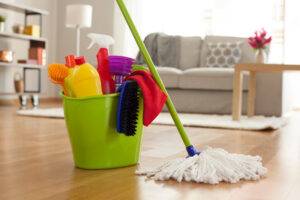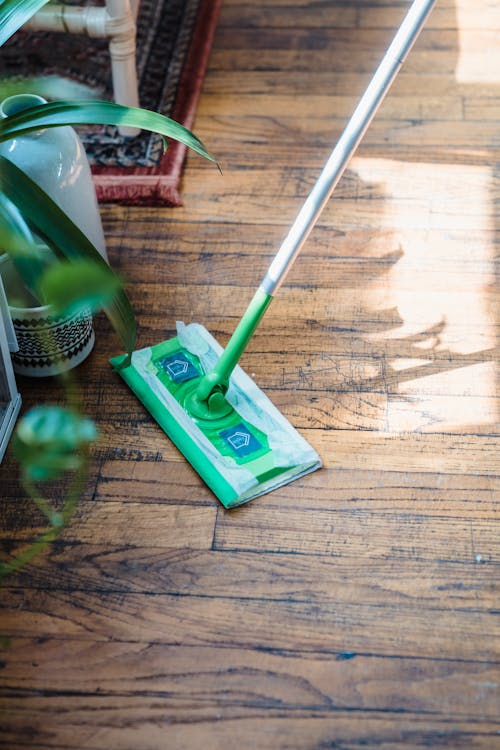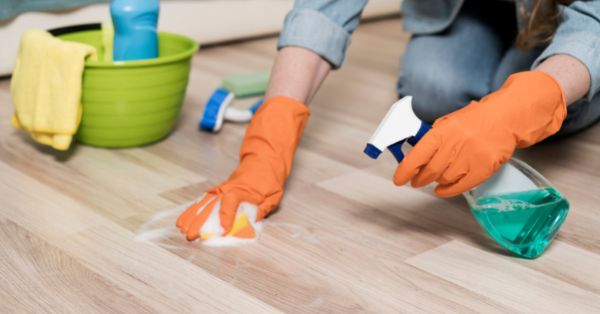Keeping your tiled surfaces pristine often begins with effective cleaning floor grout. Grout can accumulate dirt, stains, and bacteria over time, negatively impacting the overall appearance of your home. In busy areas like kitchens and primary bathrooms, it’s recommended to clean grout weekly to maintain that sparkling finish1. Regular upkeep not only enhances the visual appeal of your home but also extends the longevity of your grout lines, saving you from costly repairs and replacements.
This article will explore various grout cleaning techniques, from homemade solutions to commercial products, enabling you to achieve a cleaner, brighter floor. Whether tackling stubborn stains or just performing routine maintenance, we’ve got you covered with practical advice, estimated times for each method, and essential tools23.

Understanding Floor Grout: What You Need to Know
Floor grout comes in several types, with cement-based grout being the most common choice among homeowners. This type is available in both sanded and unsanded varieties, making it suitable for a wide range of residential applications4. Epoxy grout offers superior strength and resistance, which is ideal for commercial kitchens, pools, and areas with high foot traffic. While its price is higher, the durability and performance it provides justifies the investment4.
Furan grout stands out for its extreme chemical resistance, primarily used in industrial settings rather than residential projects due to its cost and strong odor4. Each grout type has specific grout composition that impacts where and how it should be used. For instance, sanded grout works best for wider joints, while unsanded grout suits narrower gaps4. Understanding floor grout knowledge in terms of joint width, tile material, and maintenance will guide consumers in selecting the right product according to their needs.
The primary concern with floor grout involves its high porosity, which causes it to absorb grease, stains, grime, and dirt. Mold development is common in grout, particularly in bathrooms where moisture levels are high. This situation may require the use of specialized cleaning products5. Daily care is essential for maintaining grout and preventing damage, which can arise due to wear and tear, moisture exposure, or improper installation5.
Identifying signs of grout damage, such as mold buildup, loose tiles, and cracks, is crucial for maintaining the overall integrity of tiled surfaces5. Proper grout care not only enhances appearance but supports the structural integrity of your flooring choices. By understanding the types of floor grout available and their unique characteristics, homeowners can make informed decisions about cleaning methods and products that will best preserve their surfaces.
Why Cleaning Floor Grout is Important
The importance of cleaning grout cannot be overstated as it plays a key role in preserving the life and aesthetic value of your tile floors. Regular maintenance helps extend the life span of the flooring by reducing wear and tear from dirt and contaminants6. Dirty grout creates an uninviting environment, making it essential to clean to maintain a bright and appealing appearance6. Beyond aesthetics, there are significant health implications; grime can harbor harmful bacteria and germs, leading to potential health risks for occupants6. By scrubbing the grout, you contribute to a healthier living space, preventing the buildup of allergens and ensuring the cleanliness of your environment7. The aesthetic value of clean grout cannot be underestimated, as it can drastically improve the overall impression of any space, whether residential or commercial6. Moreover, maintaining clean grout reduces the risk of mold and mildew growth, which thrive in dirty conditions, further emphasizing the need for regular cleaning7. For those seeking comprehensive solutions, consider professional cleaning services that can provide thorough treatments and maintain the beauty and hygiene of your flooring effectively6.
Learn about the importanceof cleaning for a healthier home and improved appearance.
Tools You Need for Cleaning Floor Grout
Cleaning floor grout effectively requires the right tools, making the choice of grout cleaning tools essential. Start with rubber gloves as necessary equipment to protect your skin from harsh chemicals. Specialized grout brushes, such as battery-operated versions, can significantly reduce labor and improve results. For larger cleaning projects, consider using a vacuum cleaner to remove loose dirt and dust before applying any cleaning solutions.
When searching for cleaning floor grout tools, top brands can make a difference. The Zep Grout Cleaner & Brightener emerged as the best bottled grout cleaner based on online reviews, showcasing its high effectiveness in eliminating stains without extensive scrubbing8. If you’re looking for a versatile solution, the Granite Gold Grout Cleaner is ideal for delicate surfaces like marble and natural stone, providing a safe cleaning method8. Incorporating options like a Bissell steam cleaner with a grout brush attachment offers an eco-friendly way to lift dirt while sanitizing8.
In addition to store-bought items, consider homemade solutions as viable cleaning alternatives. A combination of baking soda, hydrogen peroxide, and dish detergent has shown remarkable results without harsh chemicals8. Such DIY options can be more affordable, making it easier for different budgets to maintain clean grout9. Always remember that proper tool selection will save time and enhance your cleaning experience.
For further personalized guidance on cleaning tools and products, feel free to reach out via our contact page.

Best Homemade Solutions for Grout Cleaning
Creating your own homemade grout cleaners is a fantastic way to use natural cleaning solutions that are both eco-friendly and effective. One popular recipe combines 1/4 cup hydrogen peroxide, 1/3 cup baking soda, and 1 teaspoon of dish soap to form a potent paste that tackles tough stains10. This blend not only cleans well but is also safe for most types of grout, ensuring that you maintain the integrity of your surfaces10. For an even easier option, simply mix baking soda with warm water until it reaches a paste-like consistency, applying it directly to grout lines11.
When using these DIY grout cleaning techniques, it’s crucial to let the solution soak for about 10 minutes before scrubbing10. This allows the ingredients to break down dirt and grime, facilitating a deeper clean. Working in sections of approximately three feet by three feet can help manage your cleaning process, making it less overwhelming and more effective10.
Using a microfiber mop instead of a sponge mop is advisable, as it helps prevent dirty water from soiling grout lines11. Grout maintenance is important; cleaning tile floors weekly can minimize buildup, keeping your grout looking fresh11. Remember to test your homemade grout cleaners on a small area first to avoid any adverse reactions and ensure the safety of your surfaces10.
Incorporating these natural cleaning solutions into your cleaning routine not only promotes a healthier home environment but also eliminates the need for harsh chemical cleaners. The combination of baking soda and hydrogen peroxide works especially well for removing mildew and soap scum, making it versatile for use in kitchens and bathrooms10.
Commercial Grout Cleaners: Pros and Cons
When considering commercial grout cleaners, it’s essential to weigh the advantages and disadvantages associated with them. Popular products like Zep Grout Cleaner and Granite Gold Grout Cleaner have garnered significant attention and positive reviews, simplifying the process of buying grout cleaners12. Zep, for instance, boasts an impressive average rating of 4.3 stars from over 1,700 reviews12, showcasing its effectiveness in removing tough stains. However, while these solutions can deliver promising results, they sometimes pose safety concerns, especially for unsealed grout.
Some commercial grout cleaners, like CLR Brilliant Bath, are EPA Safer Choice Certified12, indicating they contain safer ingredients for users and the environment. This certification can alleviate worries about harsh chemicals. On the downside, the reliance on chemical cleaners can raise environmental implications. It’s important to consider these factors when evaluating the effectiveness of these products.
In terms of cleaning power, professional options, such as those offered by Zerorez, utilize advanced techniques like the Zr™ Lifter tool and Zr™ Water for superior results13. These professional services not only promise effective cleaning but also enhance the longevity of grout cleanliness13. The choice between DIY and commercial cleaners ultimately comes down to personal preference, budget, and specific cleaning needs. Remember, educating oneself on the specific strengths of each option can lead to informed decisions when buying grout cleaners.
Step-by-Step Guide to Cleaning Grout
Cleaning floor grout does not have to be an overwhelming task. Following this grout cleaning guide can simplify the cleaning process with effective step-by-step cleaning methods. Start with a thorough sweep to remove dust and debris. This preliminary preparation helps ensure that your cleaning efforts yield the best results.
Next, choose the right cleaning solution for your needs. A DIY grout cleaner can offer impressive results, receiving a rating of 4/5 for its effectiveness while being budget-friendly with common household ingredients14. Alternatively, consider commercial products. Grout-EEZ is known for tackling tough stains effectively, although it has a strong chemical smell and a higher price point14.
To apply the cleaner, use a scrub brush or sponge, ensuring you work the solution into the grout lines. Let it sit for at least 10 minutes for maximum effectiveness. For lightly stained areas, steam cleaners perform admirably, achieving a 5/5 rating for routine cleaning14. After this period, scrub the grout vigorously to loosen any remaining dirt.
Once you’re satisfied with the results, rinse the area thoroughly with clean water. This step is key to removing any residual cleaning agents. If stubborn stains persist despite your best efforts, techniques like using fine-grit sandpaper can be an option15. Finally, consider sealing the grout to protect against future stains. Sealed grout is more resistant to cleaning solutions like vinegar, further prolonging the life of your tile floor15.
By adhering to these instructions in this grout cleaning guide, you can maintain clean and beautiful tile surfaces for years to come.
Explore more about effective cleaningsolutions.
Tips for Stubborn Stains in Grout
Dealing with stubborn grout stains can be quite the challenge, but effective deep cleaning tips can make a significant difference. One popular method involves using steam cleaners with grout attachments, which are rated 3/5 for deep cleaning effectiveness and 5/5 for routine cleaning16. For those persistent stains, consider a specialized cleaner like Grout-EEZ, which has a strong 4/5 cleaning performance rating16. DIY mixing solutions often yield great results, with certain homemade recipes receiving a solid 4/5 effectiveness score16.
It’s essential to apply cleaning techniques carefully to avoid damaging the grout. For example, using a medium-bristle nylon brush allows for effective scrubbing without harming the surface17. For tough stains, a blend of baking soda and vinegar has proven beneficial, particularly for sealed grout17. Household vinegar or mild grout cleaner should also be employed regularly to maintain stain resistance17.
If you find yourself overwhelmed by the amount of time taken to clean stubborn stains, utilizing products like the Polyblend Grout Renew can be an effective long-term solution18. While initially pricing at around $12, it’s important to strategize your application process, as it involves a 24-hour drying period after each treatment18. This product can provide results that last nearly two years, making it a worthy investment for maintaining clean grout18.
Lastly, always be prepared for a variety of cleaning methods. Since different grout types respond uniquely to treatment, understanding the specific characteristics—such as how epoxy grout absorbs 50 times less water than traditional cement grout—can guide your cleaning approach17. Consider using the Magic Eraser or oxygen bleach, which are effective options for tackling tough stains effectively17.
How to Maintain Clean Grout
Keeping grout clean requires dedication to grout maintenance tips that emphasize routine cleaning. A deep clean is necessary at least once every week or two to effectively tackle body oils and soap scum, regardless of daily cleaning efforts19. Implementing a simple water and baking soda paste weekly can help in maintaining grout, providing preventive care to avoid tough stains.
For stain removal, bleach pens work well for spot treatments, while less harsh oxygen-type powdered bleach is effective for more stubborn stains19. The use of grout renewal products can significantly extend the life of grout, offering protection against future discoloration. Look out for signs that indicate the need for replacement, such as flaking or breaking grout, to prevent potential water damage.
When it comes to efficiency, steam cleaners rank favorably, receiving a 3/5 for deep cleaning and a solid 5/5 for routine cleaning20. DIY cleaning solutions tend to score high as well; a homemade cleaner received 4/5 for effectiveness, albeit requiring more effort than commercial alternatives20. The Pink Stuff has been noted for its affordability and quick action, making it a valuable addition to your grout maintenance toolkit at just $520.
In conclusion, routine cleaning strategies and preventive measures are essential for maintaining clean grout, ensuring that your surfaces remain pristine over time.
When to Reseal Grout
Proper grout care is essential for maintaining the integrity of your tiled surfaces. Resealing grout should typically occur every one to two years, depending on foot traffic and moisture exposure in the area21.
Newly installed grout requires a drying period of about 48 to 72 hours before applying any sealer for optimal protection21. After a thorough cleaning, sealing the grout becomes vital as it protects against water and contaminants that may lead to discoloration22. Grout enhances stain resistance and durability when properly sealed, making future cleaning efforts more manageable23.
It’s important to assess the condition of your grout regularly. Unsealed grout is prone to damage and erosion over time; therefore, timely resealing can help mitigate potential grout damage and prolong the life of your tiled areas22. The choice of sealer matters, with penetrating sealers recommended for natural stone tiles to combat staining, while membrane-forming sealers are suitable for glazed ceramic tiles, providing a glossy finish21.
For areas with low exposure to chemicals, water-based sealants are preferable, ensuring the aesthetic desired while maintaining protection23.
Ultimately, following these grout sealing tips can significantly benefit your ongoing grout care efforts, ensuring your different tiled areas remain beautiful and durable for years to come.
FAQs About Cleaning Floor Grout
When it comes to grout cleaning FAQs, many homeowners share common questions about the best methods and products to use. One frequent concern involves the use of vinegar. Although vinegar is a popular homemade cleaning solution, its acidity can damage certain types of grout, particularly those mixed with cement. This could lead to erosion or visible fading over time. Instead, consider utilizing steam cleaning as a powerful alternative that effectively removes grime without introducing potential damage24.
Another common question focuses on the frequency of professional grout cleaning. Experts recommend having grout professionally cleaned at least once a year to maintain its appearance and avoid long-term deterioration. For high-traffic areas like kitchens and bathrooms, cleaning it twice a year is ideal25. Homeowners often struggle with mold and mildew growth in these moisture-rich environments. Addressing such issues promptly can prevent further complications and restoration tasks.
Whether to use bleach for cleaning is another prevalent question. While bleach may seem like a quick fix, it can actually lead to grout discoloration, including yellowing and fading. Opting for milder cleaning solutions or professional help can protect the integrity of your grout24. This brings us to the importance of understanding the types of tiles and grout used in your home, as these factors significantly impact your cleaning strategies and maintenance efforts.
Lastly, many homeowners wonder when to seek professional help. Professional services are advisable for tough stains or in cases where grout is unsealed or damaged. With appropriate care and regular maintenance, such concerns can be minimized25. Implementing effective cleaning tips can ensure that your grout remains clean and vibrant, leading to a more inviting space and an overall polished look.
Conclusion: Enjoying Clean and Bright Floors
Maintaining clean grout is crucial for achieving sparkling floors that enhance the aesthetic appeal of your home. The benefits of clean grout extend beyond mere appearance; regular cleaning helps remove contaminants that can promote a healthier living environment by eliminating harmful bacteria, mold, and mildew26. Additionally, professional deep cleaning contributes to fresher air quality in your home, while also restoring the original beauty of your tiles, revealing vibrant colors and textures27.
Implementing the techniques and tips outlined in this article will enable you to keep your tiled surfaces looking their best. Scheduled deep cleaning every six months to a year is recommended to maintain their longevity and prevent costly replacements due to neglect28. Moreover, beautiful, well-maintained floors not only create a more inviting space but can also enhance the perceived value of your property, attracting potential buyers when the time comes to sell27.
Incorporating a routine of both DIY maintenance and professional deep cleaning services will make ongoing upkeep easier and more effective. Remember, investing time and effort now in maintaining your grout and tiles can significantly reduce the need for extensive treatments down the line, ensuring a healthier, more attractive, and safer home for you and your family26. Enjoy the benefits of clean surfaces and the transformative effect they bring to your living spaces!

FAQ
Q: What is the best method for cleaning floor grout?
A: The best method for cleaning floor grout often involves a combination of sweeping, using a suitable cleaning solution (either homemade or commercial), and scrubbing with a specialized grout brush to ensure effective cleaning.
Q: Can I use vinegar to clean my grout?
A: While vinegar can be effective for some cleaning tasks, it’s not recommended for grout, especially if it’s unsealed. The acidity in vinegar can deteriorate the grout over time, causing further issues.
Q: How often should I clean my grout?
A: For optimal maintenance, it’s advisable to clean your grout at least once a month. Regular cleaning prevents the build-up of dirt and grime, ensuring your tiled surfaces remain bright and healthy.
Q: Is it necessary to reseal grout?
A: Yes, resealing grout is vital to protect it against moisture absorption, stains, and degradation over time. Typically, grout should be resealed every 1-2 years, depending on the location and use.
Q: What are some common household items I can use for homemade grout cleaners?
A: Common household items for homemade grout cleaners include baking soda, hydrogen peroxide, and dish soap. These ingredients can be combined to create effective cleaning pastes or solutions.
Q: What are the risks of using commercial grout cleaners?
A: Some commercial grout cleaners contain harsh chemicals that can be harmful to unsealed grout and may pose safety risks, including skin irritation and harmful fumes. Always read the label and consider eco-friendly alternatives when possible.
Q: How do I deal with tough stains in my grout?
A: For tough stains, consider using a steam cleaner or a specialized scrubber. You can also make a paste with baking soda and hydrogen peroxide for extra scrubbing power on those stubborn grime spots.
Q: How do I maintain clean grout in the long term?
A: Regular cleanings, avoiding standing water, and using a grout sealant are essential for maintaining clean grout long-term. Implementing daily and weekly cleaning routines can also significantly reduce dirt build-up.
Q: When should I consider seeking professional help for grout cleaning?
A: If you encounter extensive staining that resists your cleaning efforts, particularly for large areas or if your grout has become damaged, it may be best to consult a professional cleaning service.



